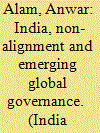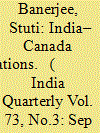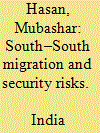| Srl | Item |
| 1 |
ID:
155180


|
|
|
|
|
| Summary/Abstract |
The first decade of the twenty-first century saw the chants of the rise of an Indian superpower. These claims of the twenty-first century as India’s century were not only based on the massive economic growth that the country saw in the post-1991 liberalisation period, and the concomitant boost in military infrastructure, but also by virtue of its having the biggest functional democracy, an influential multi-million plus diaspora, the sway of Bollywood in the region and abroad and the spectacular religious-linguistic diversity of the country. From conducting mega disaster-relief operations during the 2004 tsunami to effectuating the world’s largest civil evacuation during Operation Rahat, India has ceaselessly augmented its soft power potential to project its national power in the region. This article is an attempt to analyse the possibilities and challenges that India faces in the effective functioning of its soft power in the region. It also remarks as to how India’s soft power limitations can be quashed by integrating a smart power approach in its foreign policy by strengthening existent digital and public diplomacy infrastructure.
|
|
|
|
|
|
|
|
|
|
|
|
|
|
|
|
| 2 |
ID:
155179


|
|
|
|
|
| Summary/Abstract |
India is a significant part of Rising Asia, which has attracted considerable international attention in recent years. Two decades of sustained economic growth along with its functional liberal democratic institution of governance has made India an emerging leading voice in matters related to the reform of institutions of global governance including the UN, International Monetary Fund (IMF), World Bank and other ‘global common’ issues such as ocean, air, space and Internet, security, trade and climate. This article attempts to highlight the emerging orientation and the policy shift in the Indian leadership towards the issue of its vision and shaping of emerging global political and economic order and argues that, contrary to the prevailing view, India continues to conduct its foreign policy within the broad normative order of discourse of non-alignment, which has served India’s national interest well, including its rising aspiration of becoming a global power. The article also reflects upon the domestic challenges and unstable regional dynamics that hamper its capacity to become a global player and share the responsibility expected from a global power.
|
|
|
|
|
|
|
|
|
|
|
|
|
|
|
|
| 3 |
ID:
155183


|
|
|
|
|
| Summary/Abstract |
The India–Canada relationship has witnessed a number of highs and lows despite the two nations sharing common political views. This is perhaps best seen in the civil nuclear cooperation shared between the two. It is interesting to note that the relation between the two nations fractured twice due to nuclear issues in the past; today, nuclear cooperation is an important pillar, helping them to cement a new partnership. This article is an attempt to trace the civil nuclear relationship between India and Canada and to chart its future path. It has to be understood that the nuclear agreement between India and Canada is not restricted in its scope to just benefits for the two countries in developing nuclear technology and trade. It has larger economic and strategic benefits. India’s growing political and economic strength is promising. It is in Canada’s interest to pursue a closer relationship with India. It is in India’s interest to further strengthen this partnership in view of the resources and technology that Canada could provide India to achieve its development goals, especially its green agenda as ratified under the Paris Climate Change Agreement (2015).
|
|
|
|
|
|
|
|
|
|
|
|
|
|
|
|
| 4 |
ID:
155182


|
|
|
|
|
| Summary/Abstract |
Risk sensitivity combined with prospect theory and framing concepts can be quite useful in explaining which individuals and groups can become radicalised and more likely to resort to terrorism to achieve their political and economic objectives. Such a radicalisation can occur with groups willing to use violence for major gains and for groups seeking to prevent significant losses of status or wealth. The Sikh uprising in the Punjab in the latter part of the twentieth century is an example of terrorism based not on poverty but as part of an effort to preserve or regain a relatively advantageous position. The Sikhs were in a somewhat advantageous situation in India but faced increasing challenges to their economic, political and social position in the Punjab and in India in general. The counterterrorism policies of the government contributed to the perception of threat that further radicalised the Sikh community.
|
|
|
|
|
|
|
|
|
|
|
|
|
|
|
|
| 5 |
ID:
155181


|
|
|
|
|
| Summary/Abstract |
Against the backdrop of 2016 terrorist attack in Dhaka, this article argues that in the terrain of Bangladeshi literatures on migration, little is explored about the impact of south–south migration in unleashing security threat to Bangladesh. This article offers a historic trajectory of south–south migration and security threat to Bangladeshi state. It argues that while it is important to understand migration from various point of views, scholars have ignored to explore the nexus between migration and security threat of the sender state. This article explains why to some Muslim migrants of Bangladesh, bad ideas such as terrorism may seem to form an option and how globalisation played a role in fostering bad ideas. It proposes that scholars of migration require to indulge in further research to understand the nexus between outward migration and security threat to Bangladesh.
|
|
|
|
|
|
|
|
|
|
|
|
|
|
|
|